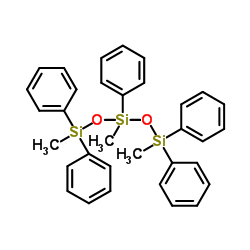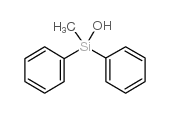3390-61-2
| 中文名 | 1,3,5-三甲基-1,1,3,5,5-五苯基三硅二氧烷 |
|---|---|
| 英文名 | methyl-bis[[methyl(diphenyl)silyl]oxy]-phenylsilane |
| 中文别名 |
1,3,5-三甲基-1,1,3,5,5-五苯基三硅氧烷
1,1,3,5,5-五苯基-1,3,5-三甲基硅氧烷 1,3,5-三甲基-1,1,3,5,5-五苯基三硅氧烷 |
| 英文别名 |
Dow Corning 555
UNII-HE7ABK56N5 1,1,3,5,5-pentaphenyl-1,3,5-trimethyltrisiloxane EINECS 222-222-9 Si1.Si2.Si3-Trimethyl-Si1.Si1.Si2.Si3.Si3-pentaphenyl-trisiloxan Trisiloxane,1,3,5-trimethyl-1,1,3,5,5-pentaphenyl MFCD00053659 Trisiloxane, 1,3,5-trimethyl-1,1,3,5,5-pentaphenyl- 1,3,5-Trimethyl-1,1,3,5,5-pentaphenyltrisiloxane Benzene, 1,1',1'',1''',1''''-(1,3,5-trimethyl-3-trisiloxanyl-1,5-diylidene)pentakis- 1,3,5-Trimethyl-1,1,3,5,5-tetraphenyl-trisiloxan trimethyl pentaphenyl trisiloxane Dow Corning 705 1.3.5-Trimethyl-1.1.3.5.5-pentaphenyl-trisiloxan |
| 密度 | 1.1±0.1 g/cm3 |
|---|---|
| 沸点 | 560.2±33.0 °C at 760 mmHg |
| 熔点 | -25°C |
| 分子式 | C33H34O2Si3 |
| 分子量 | 546.878 |
| 闪点 | 238.3±25.8 °C |
| 精确质量 | 546.186646 |
| PSA | 18.46000 |
| LogP | 13.50 |
| 外观性状 | 无色透明或淡黄色透明液体 |
| 蒸汽压 | 0.0±1.5 mmHg at 25°C |
| 折射率 | 1.600 |
| 储存条件 | 密封储存,储存于阴凉、干燥的库房。 |
| 稳定性 | 常温常压下稳定,与氧化性材料反应。 |
| 水溶解性 | 不溶 |
| 计算化学 | 1.疏水参数计算参考值(XlogP):无 2.氢键供体数量:0 3.氢键受体数量:2 4.可旋转化学键数量:9 5.互变异构体数量:无 6.拓扑分子极性表面积18.5 7.重原子数量:38 8.表面电荷:0 9.复杂度:615 10.同位素原子数量:0 11.确定原子立构中心数量:0 12.不确定原子立构中心数量:0 13.确定化学键立构中心数量:0 14.不确定化学键立构中心数量:0 15.共价键单元数量:1 |
| 更多 | 1. 性状:透明的粘稠液体 2. 密度(g/mL,25℃):1.09 3. 相对蒸汽密度(g/mL,空气=1):未确定 4. 熔点(ºC):-25 5. 沸点(ºC,常压):未确定 6. 沸点(ºC,0.5mmHg):245 7. 折射率(n20/D):1.58 8. 闪点(ºC):101 9. 比旋光度(º):未确定 10. 自燃点或引燃温度(ºC):未确定 11. 蒸气压(mPa,20ºC):未确定 12. 饱和蒸气压(kPa,25ºC):未确定 13. 燃烧热(KJ/mol):未确定 14. 临界温度(ºC):未确定 15. 临界压力(KPa):未确定 16. 油水(辛醇/水)分配系数的对数值:未确定 17. 爆炸上限(%,V/V):未确定 18. 爆炸下限(%,V/V):未确定 19. 溶解性:未确定 |
Synonym:1,3,5-Trimethyl-1,1,3,5,5-Pentaphenyltrisiloxane Section 2 - COMPOSITION, INFORMATION ON INGREDIENTS
Risk Phrases: 36 Section 3 - HAZARDS IDENTIFICATION EMERGENCY OVERVIEW
Irritating to eyes.The toxicological properties of this material have not been fully investigated. Potential Health Effects Eye: Causes eye irritation. May cause chemical conjunctivitis. Skin: May cause skin irritation. Ingestion: May cause gastrointestinal irritation with nausea, vomiting and diarrhea. The toxicological properties of this substance have not been fully investigated. Inhalation: May cause respiratory tract irritation. The toxicological properties of this substance have not been fully investigated. Chronic: No information found. Section 4 - FIRST AID MEASURES Eyes: Immediately flush eyes with plenty of water for at least 15 minutes, occasionally lifting the upper and lower eyelids. Get medical aid. Skin: Get medical aid. Flush skin with plenty of water for at least 15 minutes while removing contaminated clothing and shoes. Wash clothing before reuse. Ingestion: Never give anything by mouth to an unconscious person. Get medical aid. Do NOT induce vomiting. If conscious and alert, rinse mouth and drink 2-4 cupfuls of milk or water. Wash mouth out with water. Inhalation: Remove from exposure and move to fresh air immediately. If not breathing, give artificial respiration. If breathing is difficult, give oxygen. Get medical aid. Notes to Physician: Section 5 - FIRE FIGHTING MEASURES General Information: As in any fire, wear a self-contained breathing apparatus in pressure-demand, MSHA/NIOSH (approved or equivalent), and full protective gear. During a fire, irritating and highly toxic gases may be generated by thermal decomposition or combustion. Will burn if involved in a fire. Vapors from liquefied gas are initially heavier than air and spread along ground. Runoff from fire control or dilution water may cause pollution. Extinguishing Media: Use water spray to cool fire-exposed containers. Use water spray, dry chemical, carbon dioxide, or chemical foam. Use agent most appropriate to extinguish fire. Section 6 - ACCIDENTAL RELEASE MEASURES General Information: Use proper personal protective equipment as indicated in Section 8. Spills/Leaks: Absorb spill with inert material (e.g. vermiculite, sand or earth), then place in suitable container. Avoid runoff into storm sewers and ditches which lead to waterways. Clean up spills immediately, observing precautions in the Protective Equipment section. Provide ventilation. Section 7 - HANDLING and STORAGE Handling: Wash thoroughly after handling. Use with adequate ventilation. Avoid breathing dust, vapor, mist, or gas. Avoid contact with eyes, skin, and clothing. Keep container tightly closed. Avoid ingestion and inhalation. Storage: Store in a tightly closed container. Store in a cool, dry, well-ventilated area away from incompatible substances. Section 8 - EXPOSURE CONTROLS, PERSONAL PROTECTION Engineering Controls: Facilities storing or utilizing this material should be equipped with an eyewash facility and a safety shower. Use adequate ventilation to keep airborne concentrations low. Exposure Limits CAS# 3390-61-2: Personal Protective Equipment Eyes: Wear appropriate protective eyeglasses or chemical safety goggles as described by OSHA's eye and face protection regulations in 29 CFR 1910.133 or European Standard EN166. Skin: Wear appropriate protective gloves to prevent skin exposure. Clothing: Wear appropriate protective clothing to prevent skin exposure. Respirators: Follow the OSHA respirator regulations found in 29 CFR 1910.134 or European Standard EN 149. Use a NIOSH/MSHA or European Standard EN 149 approved respirator if exposure limits are exceeded or if irritation or other symptoms are experienced. Section 9 - PHYSICAL AND CHEMICAL PROPERTIES Physical State: Viscous liquid Color: Clear Odor: Not available. pH: Not available. Vapor Pressure: Not available. Viscosity: Not available. Boiling Point: 225 deg C @ 0.5 mmHg Freezing/Melting Point: -25 deg C Autoignition Temperature: Not available. Flash Point: 243 deg C ( 469.40 deg F) Explosion Limits, lower: Not available. Explosion Limits, upper: Not available. Decomposition Temperature: Solubility in water: Insoluble. Specific Gravity/Density: 1.09 Molecular Formula: C33H34O2Si3 Molecular Weight: 546.49 Section 10 - STABILITY AND REACTIVITY Chemical Stability: Stable at room temperature in closed containers under normal storage and handling conditions. Conditions to Avoid: Incompatible materials, excess heat. Incompatibilities with Other Materials: Oxidizing agents. Hazardous Decomposition Products: Carbon monoxide, carbon dioxide, silicon dioxide, formaldehyde. Hazardous Polymerization: Will not occur. Section 11 - TOXICOLOGICAL INFORMATION RTECS#: CAS# 3390-61-2 unlisted. LD50/LC50: Not available. Carcinogenicity: 1,1,3,5,5-Pentaphenyl-1,3,5-Trimethyltrisiloxane - Not listed by ACGIH, IARC, or NTP. Section 12 - ECOLOGICAL INFORMATION Section 13 - DISPOSAL CONSIDERATIONS Dispose of in a manner consistent with federal, state, and local regulations. Section 14 - TRANSPORT INFORMATION IATA Not regulated as a hazardous material. IMO Not regulated as a hazardous material. RID/ADR Not regulated as a hazardous material. Section 15 - REGULATORY INFORMATION European/International Regulations European Labeling in Accordance with EC Directives Hazard Symbols: XI Risk Phrases: R 36 Irritating to eyes. Safety Phrases: S 26 In case of contact with eyes, rinse immediately with plenty of water and seek medical advice. S 39 Wear eye/face protection. WGK (Water Danger/Protection) CAS# 3390-61-2: No information available. Canada CAS# 3390-61-2 is listed on Canada's DSL List. CAS# 3390-61-2 is not listed on Canada's Ingredient Disclosure List. US FEDERAL TSCA CAS# 3390-61-2 is listed on the TSCA inventory. SECTION 16 - ADDITIONAL INFORMATION N/A |
| 危害码 (欧洲) | Xi: Irritant; |
|---|---|
| 风险声明 (欧洲) | R36 |
| 安全声明 (欧洲) | 26-36-39 |
| 危险品运输编码 | UN 2810 |
| WGK德国 | 3 |
| 包装等级 | III |
| 危险类别 | 6.1 |
| 海关编码 | 2934999090 |
|
~91% 
3390-61-2 |
| 文献:Shin-Etsu Chemical Co., Ltd. Patent: US5097055 A1, 1992 ; |
| 海关编码 | 2934999090 |
|---|---|
| 中文概述 | 2934999090. 其他杂环化合物. 增值税率:17.0%. 退税率:13.0%. 监管条件:无. 最惠国关税:6.5%. 普通关税:20.0% |
| 申报要素 | 品名, 成分含量, 用途 |
| Summary | 2934999090. other heterocyclic compounds. VAT:17.0%. Tax rebate rate:13.0%. . MFN tariff:6.5%. General tariff:20.0% |



